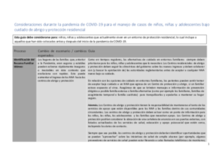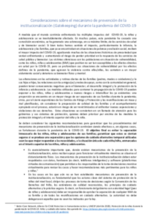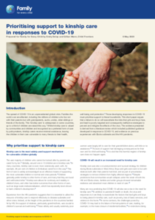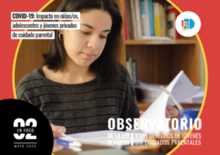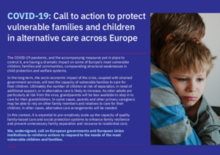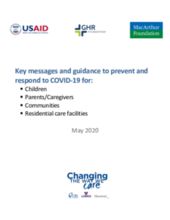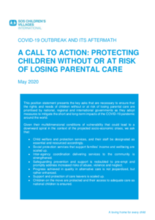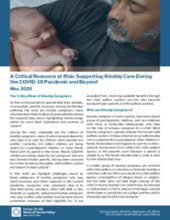This section includes resources and tools related to alternative care during the COVID-19 pandemic.
Displaying 91 - 100 of 185
Esta guía debe considerarse para: niños, niñas y adolescentes que actualmente viven en un entorno de protección residencial, lo cual incluye a aquellos que han sido colocados antes y después del inicio de la pandemia de COVID-19.
Este documento presenta recomendaciones para garantizar que los procedimientos del mecanismo de prevención de la institucionalización continúen siendo efectivos o, en algunos casos, se fortalezcan durante la pandemia de la COVID-19.
This short paper from Family for Every Child argues that a failure to prioritize support for kinship care during the COVID-19 pandemic will exacerbate the risks that girls and boys face, and lead to poorly targeted and consequently ineffective strategies to prevent and mitigate the effects of the virus. The evidence presented is derived from a literature review which included published guidance developed in response to COVID-19, and evidence on previous experiences with Ebola outbreaks and the HIV pandemic.
El presente informe sistematiza la información recabada en encuentros virtuales realizados con adolescentes y jóvenes y con equipos del Sistema de promoción y protección de derechos desde el inicio del aislamiento. Se pudo relevar información sobre el impacto social del aislamiento en contextos institucionales, las dificultades que enfrentan en el cumplimiento de las medidas de aislamiento y de las pautas de cuidado, así como también las buenas prácticas que están teniendo lugar en el marco del cuidado de niñas, niños, adolescentes y jóvenes (NNAJ) privados de cuidado parental.
This blog post from Strengthening Families For Abandoned Children (SFAC) features a decision map and accompanying guide to making decisions about where and how to place a child during a large-scale emergency, like the COVID-19 pandemic.
El presente informe sistematiza la información recabada en encuentros virtuales realizados con adolescentes y jóvenes y con equipos del Sistema de promoción y protección de derechos desde el inicio del aislamiento.
This call to action, endorsed by several organizations, calls on European governments and European Union institutions to reinforce actions to respond to the needs of the most vulnerable children and families during the COVID-19 crisis. It outlines the main challenges for vulnerable children and families, and what the EU and European governments can do to address these challenges.
This document features key messages including critical information about keeping children safe and healthy during the COVID-19 pandemic. The messages are designed for use by country child protection actors, such as public child protection officers, directors of residential care facilities and government and civil society actors that work with vulnerable children and families.
This position statement presents the key asks that are necessary to ensure that the rights and needs of children without or at risk of losing parental care are prioritised by national, regional and international governments as they adopt measures to mitigate the short and long-term impacts of the COVID-19 pandemic around the world.
This brief explores kinship care and how this critical resource is at risk now and in the future.

